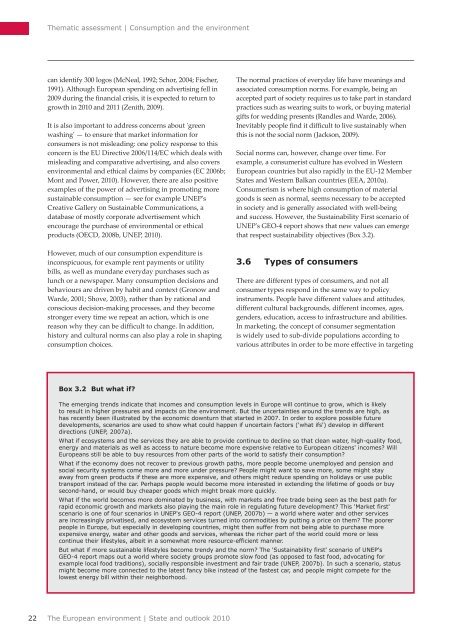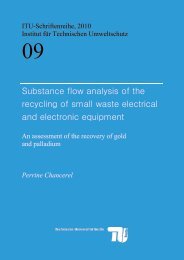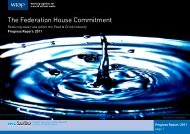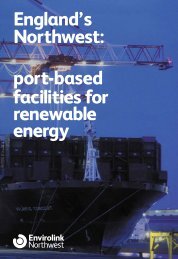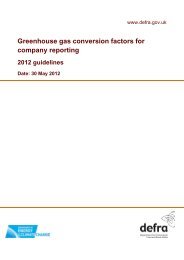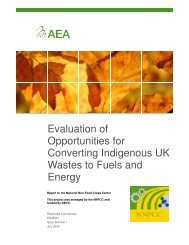Consumption and the environment (SOER2010) - European ...
Consumption and the environment (SOER2010) - European ...
Consumption and the environment (SOER2010) - European ...
You also want an ePaper? Increase the reach of your titles
YUMPU automatically turns print PDFs into web optimized ePapers that Google loves.
Thematic assessment | <strong>Consumption</strong> <strong>and</strong> <strong>the</strong> <strong>environment</strong><br />
can identify 300 logos (McNeal, 1992; Schor, 2004; Fischer,<br />
1991). Although <strong>European</strong> spending on advertising fell in<br />
2009 during <strong>the</strong> financial crisis, it is expected to return to<br />
growth in 2010 <strong>and</strong> 2011 (Zenith, 2009).<br />
It is also important to address concerns about 'green<br />
washing' — to ensure that market information for<br />
consumers is not misleading: one policy response to this<br />
concern is <strong>the</strong> EU Directive 2006/114/EC which deals with<br />
misleading <strong>and</strong> comparative advertising, <strong>and</strong> also covers<br />
<strong>environment</strong>al <strong>and</strong> ethical claims by companies (EC 2006b;<br />
Mont <strong>and</strong> Power, 2010). However, <strong>the</strong>re are also positive<br />
examples of <strong>the</strong> power of advertising in promoting more<br />
sustainable consumption — see for example UNEP's<br />
Creative Gallery on Sustainable Communications, a<br />
database of mostly corporate advertisement which<br />
encourage <strong>the</strong> purchase of <strong>environment</strong>al or ethical<br />
products (OECD, 2008b, UNEP, 2010).<br />
However, much of our consumption expenditure is<br />
inconspicuous, for example rent payments or utility<br />
bills, as well as mundane everyday purchases such as<br />
lunch or a newspaper. Many consumption decisions <strong>and</strong><br />
behaviours are driven by habit <strong>and</strong> context (Gronow <strong>and</strong><br />
Warde, 2001; Shove, 2003), ra<strong>the</strong>r than by rational <strong>and</strong><br />
conscious decision-making processes, <strong>and</strong> <strong>the</strong>y become<br />
stronger every time we repeat an action, which is one<br />
reason why <strong>the</strong>y can be difficult to change. In addition,<br />
history <strong>and</strong> cultural norms can also play a role in shaping<br />
consumption choices.<br />
The normal practices of everyday life have meanings <strong>and</strong><br />
associated consumption norms. For example, being an<br />
accepted part of society requires us to take part in st<strong>and</strong>ard<br />
practices such as wearing suits to work, or buying material<br />
gifts for wedding presents (R<strong>and</strong>les <strong>and</strong> Warde, 2006).<br />
Inevitably people find it difficult to live sustainably when<br />
this is not <strong>the</strong> social norm (Jackson, 2009).<br />
Social norms can, however, change over time. For<br />
example, a consumerist culture has evolved in Western<br />
<strong>European</strong> countries but also rapidly in <strong>the</strong> EU‐12 Member<br />
States <strong>and</strong> Western Balkan countries (EEA, 2010a).<br />
Consumerism is where high consumption of material<br />
goods is seen as normal, seems necessary to be accepted<br />
in society <strong>and</strong> is generally associated with well-being<br />
<strong>and</strong> success. However, <strong>the</strong> Sustainability First scenario of<br />
UNEP's GEO-4 report shows that new values can emerge<br />
that respect sustainability objectives (Box 3.2).<br />
3.6 Types of consumers<br />
There are different types of consumers, <strong>and</strong> not all<br />
consumer types respond in <strong>the</strong> same way to policy<br />
instruments. People have different values <strong>and</strong> attitudes,<br />
different cultural backgrounds, different incomes, ages,<br />
genders, education, access to infrastructure <strong>and</strong> abilities.<br />
In marketing, <strong>the</strong> concept of consumer segmentation<br />
is widely used to sub-divide populations according to<br />
various attributes in order to be more effective in targeting<br />
Box 3.2 But what if?<br />
The emerging trends indicate that incomes <strong>and</strong> consumption levels in Europe will continue to grow, which is likely<br />
to result in higher pressures <strong>and</strong> impacts on <strong>the</strong> <strong>environment</strong>. But <strong>the</strong> uncertainties around <strong>the</strong> trends are high, as<br />
has recently been illustrated by <strong>the</strong> economic downturn that started in 2007. In order to explore possible future<br />
developments, scenarios are used to show what could happen if uncertain factors ('what ifs') develop in different<br />
directions (UNEP, 2007a).<br />
What if ecosystems <strong>and</strong> <strong>the</strong> services <strong>the</strong>y are able to provide continue to decline so that clean water, high-quality food,<br />
energy <strong>and</strong> materials as well as access to nature become more expensive relative to <strong>European</strong> citizens' incomes? Will<br />
<strong>European</strong>s still be able to buy resources from o<strong>the</strong>r parts of <strong>the</strong> world to satisfy <strong>the</strong>ir consumption?<br />
What if <strong>the</strong> economy does not recover to previous growth paths, more people become unemployed <strong>and</strong> pension <strong>and</strong><br />
social security systems come more <strong>and</strong> more under pressure? People might want to save more, some might stay<br />
away from green products if <strong>the</strong>se are more expensive, <strong>and</strong> o<strong>the</strong>rs might reduce spending on holidays or use public<br />
transport instead of <strong>the</strong> car. Perhaps people would become more interested in extending <strong>the</strong> lifetime of goods or buy<br />
second-h<strong>and</strong>, or would buy cheaper goods which might break more quickly.<br />
What if <strong>the</strong> world becomes more dominated by business, with markets <strong>and</strong> free trade being seen as <strong>the</strong> best path for<br />
rapid economic growth <strong>and</strong> markets also playing <strong>the</strong> main role in regulating future development? This 'Market first'<br />
scenario is one of four scenarios in UNEP's GEO-4 report (UNEP, 2007b) — a world where water <strong>and</strong> o<strong>the</strong>r services<br />
are increasingly privatised, <strong>and</strong> ecosystem services turned into commodities by putting a price on <strong>the</strong>m? The poorer<br />
people in Europe, but especially in developing countries, might <strong>the</strong>n suffer from not being able to purchase more<br />
expensive energy, water <strong>and</strong> o<strong>the</strong>r goods <strong>and</strong> services, whereas <strong>the</strong> richer part of <strong>the</strong> world could more or less<br />
continue <strong>the</strong>ir lifestyles, albeit in a somewhat more resource-efficient manner.<br />
But what if more sustainable lifestyles become trendy <strong>and</strong> <strong>the</strong> norm? The 'Sustainability first' scenario of UNEP's<br />
GEO‐4 report maps out a world where society groups promote slow food (as opposed to fast food, advocating for<br />
example local food traditions), socially responsible investment <strong>and</strong> fair trade (UNEP, 2007b). In such a scenario, status<br />
might become more connected to <strong>the</strong> latest fancy bike instead of <strong>the</strong> fastest car, <strong>and</strong> people might compete for <strong>the</strong><br />
lowest energy bill within <strong>the</strong>ir neighborhood.<br />
22<br />
The <strong>European</strong> <strong>environment</strong> | State <strong>and</strong> outlook 2010


